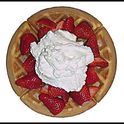What is so good about raw honey
7 Comments
ChefOnoMay 25, 2012
The problem with the idea that honey might function like an allergy shot is that vaccinations and immunotherapy work because the substances are injected directly into the body. As a general rule, when a protein hits the stomach, the digestive system immediately begins to disassemble it into usable components and it quickly becomes something quite different from what was swallowed.
Additionally, for desensitization to work, there needs to be just enough of the allergen present to stimulate the immune system but not so much as to trigger a full-blown allergic response. It's a tricky process that takes months if not years to achieve.
http://www.mayoclinic.com/health/allergy-shots/MY01158
susan G.May 25, 2012
About the pollen/allergy connection, think of it like a smallpox vaccination, or allergy desensitization. The presence of the irritant stimulates the body's immune response to protect itself. However, caution is recommended for people with pollen sensitivity, even though the concentration is very low. Also, what we call bee pollen (collected from plants by bees) is not the flower pollen that causes the common pollen allergy. (This is not technically 'homeoepathic,' but that's a topic for another time and place.)
ChefOnoMay 24, 2012
I'll file this under "Learn something new every day". I have wondered how eating honey was supposed to help with allergies. I was not aware it was a homeopathic concept. That explains a lot. Thank you.
Point of fact: All ingredients are required to be listed on the product label, HFCS is no exception. Perhaps what you are recalling are cases of illegal honey adulteration, HFCS being the logical choice as the two are virtually identical in composition, so close in fact it requires sophisticated testing to detect such practices.
Slow C.May 24, 2012
Raw honey is a super super food. Delicious, nutritious, anti-bacterial, anti-inflammatory and so much more. Different folks have different opinions about the health benefits, but some folks believe that consuming raw honey that is local to your area helps relieve/control outdoor allergies (this is a homeopathic concept). Raw honey is one of nature's most pure foods, it is one of the only foods we know of that is shelf stable for an infinite (?) period of time. As an aside, and anecdotally, I have smeared raw honey on cuts and (relatively) serious burns with remarkable effect. I do not know of any reason to pasturize honey, other than noting that additives are more easily inserted during this process (things like HFCS are not necessarily required on honey lables).
susan G.May 24, 2012
The "crystals, mold spores, pollen, flakes of wax and assorted bee parts" just mentioned are usually filtered out of raw honey, although not as highly filtered as the honey you'll find on the supermarket shelf. And remember -- honey is not likely to support mold growth or other kinds of spoilage unless it has been contaminated, in the bottling process or in use.
ChefOnoMay 23, 2012
There's something about spreading raw honey straight from the honeycomb onto a fresh buttermilk biscuit that just can't be duplicated with filtered, pasteurized honey. On the other hand, most people like their honey pure and clear, free from crystals, mold spores, pollen, flakes of wax and assorted bee parts.
susan G.May 23, 2012
Raw honey is strained but not heated. It naturally contains pollens and enzymes that are beneficial, and more. Usually what is sold as raw honey has more flavor than the mass market pasturized honeys. RH is likely to crystalize -- which some people love, since it is more spreadable.
Showing 7 out of 7 Comments
Recommended by Food52
Popular on Food52
Continue After Advertisement


